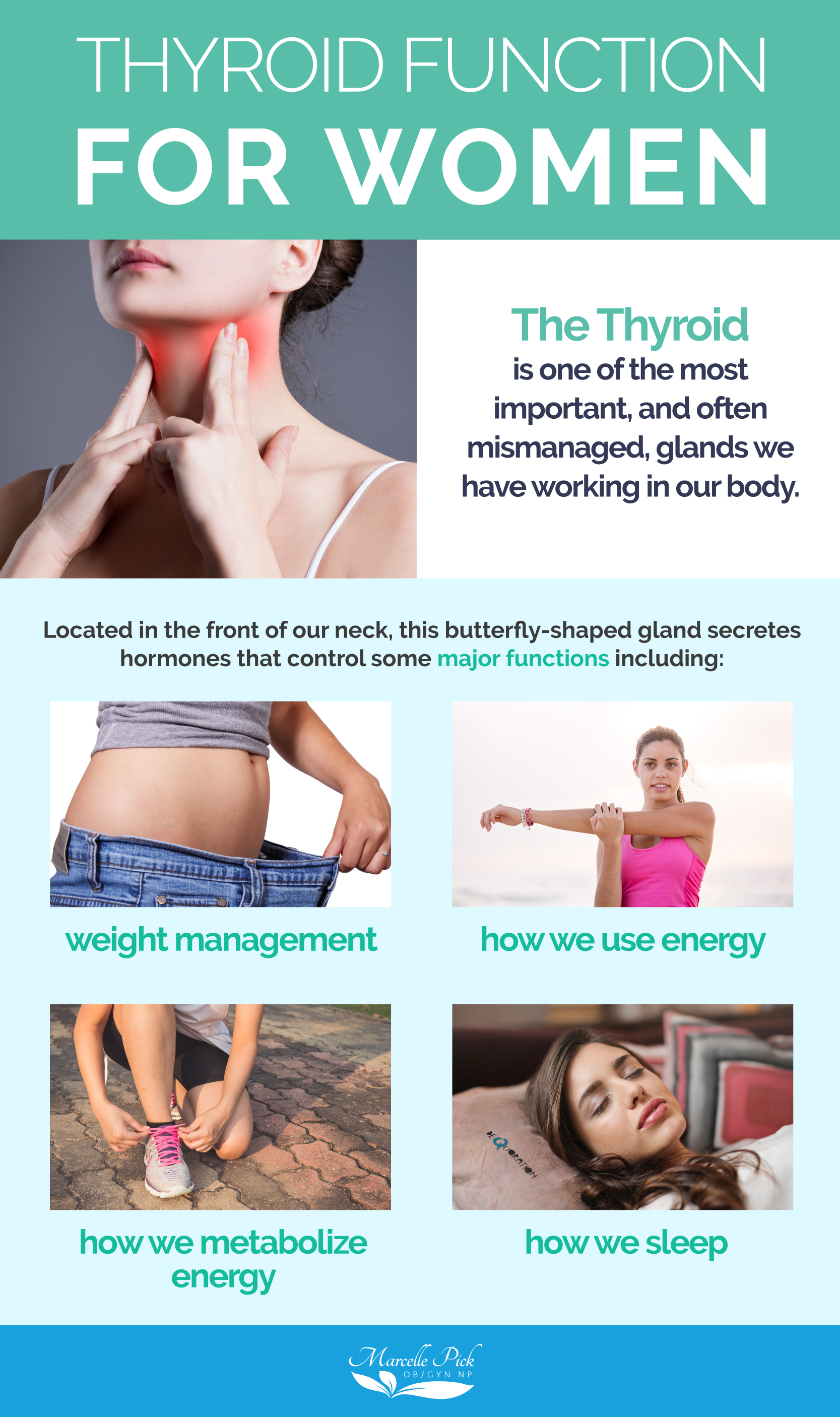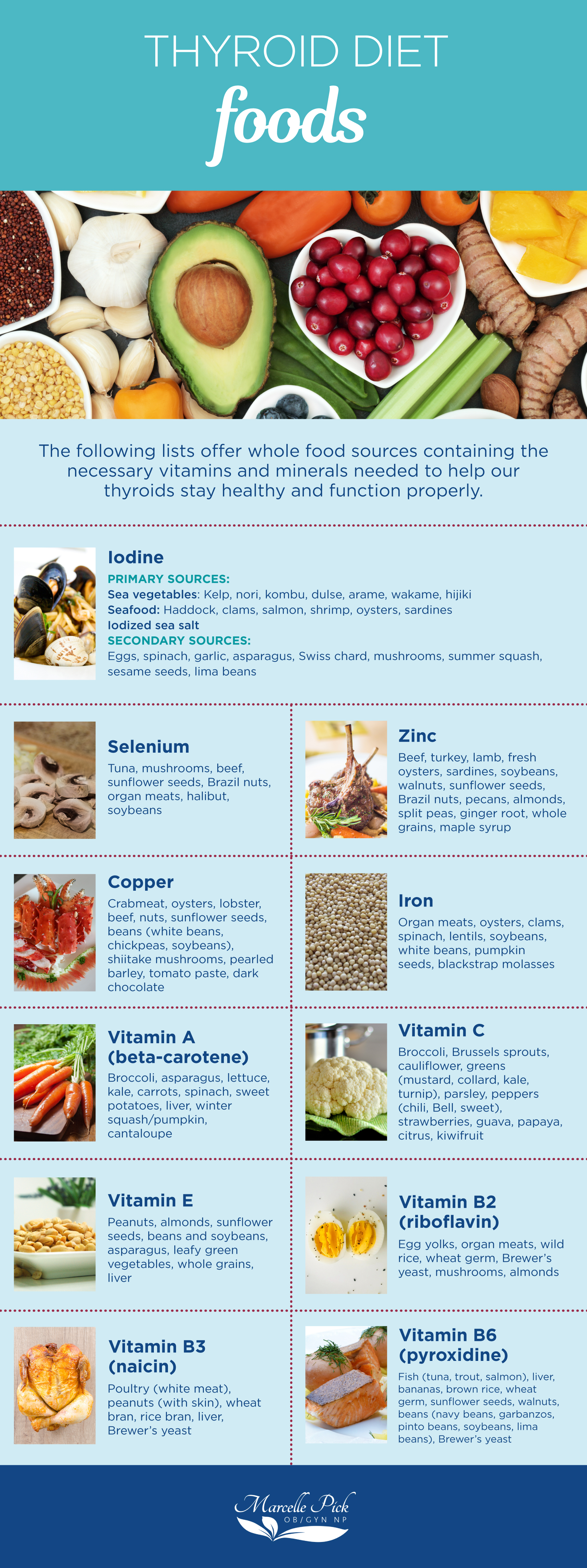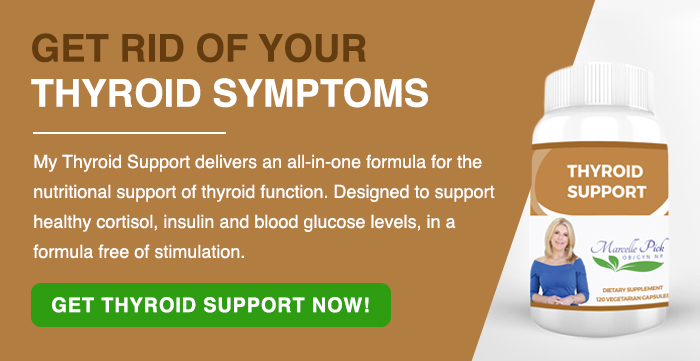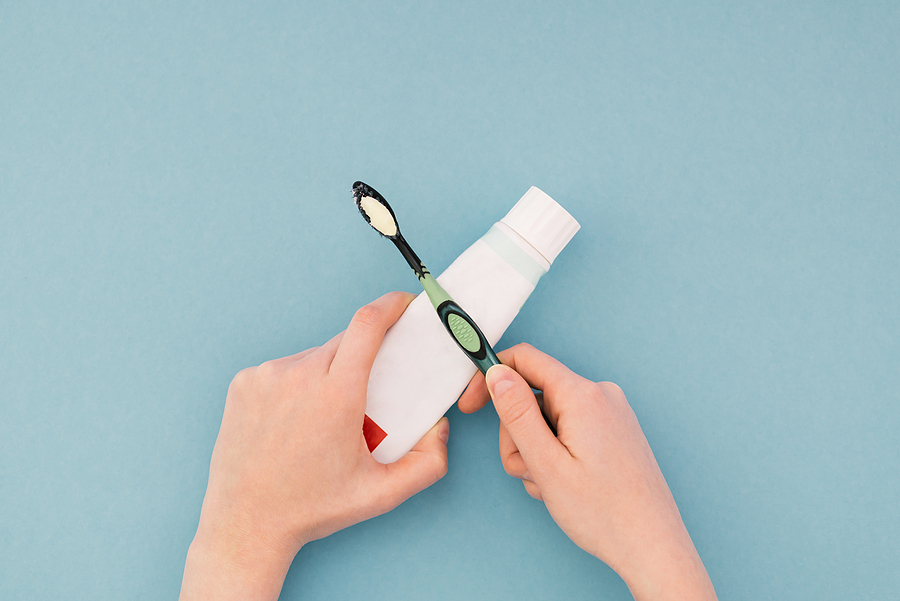Updated: July 27th, 2025
- Thyroid hormones control many major body functions, including how we sleep, how our bodies use energy, how we metabolize food, and weight management.
- Some nutrients and foods naturally support the thyroid; other foods may disrupt thyroid function.
- Try my tips to keep your thyroid hormones balanced and your body healthy.
“My thyroid hormones are out of whack, and you think I can change that by changing what I eat?” That’s what Terri said to me after I told her she should consider a thyroid-supporting diet. And my answer was, “Absolutely.”
I’m not talking about a “diet” the way many people do, meaning an eating pattern designed to make them lose weight (although if you balance your thyroid hormones, that may become much easier).
What I meant, however, was what I say all the time: food is our best medicine. I am passionate about encouraging people to eat healthy, natural foods to support their health. Food is where it all begins, and an area that we can control far more easily than other things that impact our health.
When it comes to the thyroid, how much do you know about its function and how the foods you choose can impact that functioning? If you answered “not enough,” keep reading!
The thyroid is one of the most important, and often mismanaged, glands we have working in our body. Located in the front of our neck, this butterfly-shaped gland secretes hormones that control some major functions including weight management, how we use energy, how we metabolize food, and even how we sleep.
There are so many things that can cause a woman’s thyroid hormones to shift out of balance during childbearing, menopause, and even under chronic stress. This means that women have a higher rate of thyroid conditions than men, and it impact them in many stages of their lives.
I hear women’s thyroid concerns regularly, as women want to understand symptoms that point to faulty thyroid functioning. Healthcare practitioners frequently rely solely on blood tests and do not work through the delicate gray area between “your lab results are fine” and “let’s try prescription hormone therapy.”
It’s a mistake to only consider these two very different ends of the spectrum. That leaves women at risk for a lifetime of thyroid imbalance, and possibly more serious, even irreversible, thyroid conditions.
Luckily, there are many ways to support thyroid health easily and naturally, utilizing food and nutrients to encourage proper functioning. The way we eat can help, or hurt, our thyroid gland. The nutrients our thyroid needs are easily accessible in many foods and dietary supplements. With the right information, we can make simple choices to improve thyroid health.

Which Nutrients Support Balance of Thyroid Hormones?
The thyroid gland needs specific vitamins and minerals to properly do its job. Since every woman is unique in how their hormones are functioning, the best way to get a handle on your specific needs is to have a full thyroid panel done. This helps pinpoint where individual levels may be off balance. Research shows that there are a few key nutrients that are highly valuable for everyone in supporting thyroid health.
Iodine (I): This is the most important trace element found in thyroid functioning. Without iodine, the thyroid does not have the basic building blocks it needs to make the necessary hormones to support all of the tissues in the body. Thyroxine (T4) and Triiodothyronine (T3) are the most essential, active, iodine-containing hormones we have. A 2019 NIH review of the iodine status of women of reproductive age indicated that median urinary iodine concentrations in these women have decreased below the WHO recommendation, suggesting that many women of reproductive age could have iodine deficiency. This is something we can easily improve by eating more iodine-rich foods.
Selenium (Se): This element is indispensable to our thyroid in several ways. Selenium-containing enzymes protect the thyroid gland when we are under stress, working like a “detox,” to help flush oxidative and chemical stress, and even social stress – which can cause reactions in our body. Selenium-based proteins help regulate hormone synthesis, converting T4 into the more accessible T3. These proteins and enzymes help regulate metabolism and also help maintain the right amount of thyroid hormones in the tissues and blood, as well as organs such as the liver, kidneys, and even the brain. Selenium also helps regulate and recycle our iodine stores. These are all very important functions!
Zinc (Zn), iron (Fe), and copper (CU): These three trace metals are vital to thyroid function. Low levels of zinc can cause T4, T3, and the thyroid stimulating hormone (TSH) to also become low. Research shows that both hyperthyroidism (overactive thyroid) and hypothyroidism (underactive thyroid), can sometimes create a zinc deficiency leading to lowered thyroid hormones.
Decreased levels of iron can result in decreased thyroid function as well. When combined with an iodine deficiency, iron must be replaced to repair the thyroid imbalance. Copper is needed to help produce TSH, and maintain T4 production. T4 helps cholesterol regulation, and some research even indicates copper deficiency may contribute to higher cholesterol and heart issues for people with hypothyroidism.
Antioxidants and B vitamins: Most people have heard that antioxidants are important to help temper oxidative stress, and thus combat degenerative diseases as well as improve the aging process. Vitamin A (commonly known as beta-carotene), C, and E, along with iodine and selenium, help the thyroid gland mitigate oxidative stress in an ongoing, daily process.
Oxidative stress tends to be higher with Graves disease, the most common form of hyperthyroidism. With this condition, the overactive thyroid uses more oxygen, which can result in an accumulation of oxygenated compounds that can damage cells. Antioxidants are recommended to help stop the oxidative stress before it dominoes. In addition, the B vitamins, including B2, B3, and B6, help with the manufacturing of T4. As you can see, these mechanisms are all connected, which is why the proper micronutrients are important!
What can I eat to support my thyroid?
There are a lot of great whole food sources that contain the necessary vitamins and minerals needed to help our thyroids stay healthy and function properly. Below is a great list to get you started.
Iodine
Primary sources:
Sea vegetables: Kelp, nori, kombu, dulse, arame, wakame, hijiki
Seafood: Haddock, clams, salmon, shrimp, oysters, sardines
Iodized sea salt
Secondary sources: Eggs, spinach, garlic, asparagus, Swiss chard, mushrooms, summer squash, sesame seeds, lima beans
Selenium
Tuna, mushrooms, beef, sunflower seeds, Brazil nuts, organ meats, halibut, soybeans
Zinc
Beef, turkey, lamb, fresh oysters, sardines, soybeans, walnuts, sunflower seeds, Brazil nuts, pecans, almonds, split peas, ginger root, whole grains, maple syrup
Copper
Crabmeat, oysters, lobster, beef, nuts, sunflower seeds, beans (white beans, chickpeas, soybeans), shiitake mushrooms, pearled barley, tomato paste, dark chocolate
Iron
Organ meats, oysters, clams, spinach, lentils, soybeans, white beans, pumpkin seeds, blackstrap molasses
Vitamin A (beta-carotene)
Broccoli, asparagus, lettuce, kale, carrots, spinach, sweet potatoes, liver, winter squash/pumpkin, cantaloupe
Vitamin C
Broccoli, Brussels sprouts, cauliflower, greens (mustard, collard, kale, turnip), parsley, peppers (chili, Bell, sweet), strawberries, guava, papaya, citrus, kiwifruit
Vitamin E
Peanuts, almonds, sunflower seeds, beans and soybeans, asparagus, leafy green vegetables, whole grains, liver
Vitamin B2 (riboflavin)
Egg yolks, organ meats, wild rice, wheat germ, Brewer’s yeast, mushrooms, almonds
Vitamin B3 (niacin)
Poultry (white meat), peanuts (with skin), wheat bran, rice bran, liver, Brewer’s yeast
Vitamin B6 (pyroxidine)
Fish (tuna, trout, salmon), liver, bananas, brown rice, wheat germ, sunflower seeds, walnuts, beans (navy beans, garbanzos, pinto beans, soybeans, lima beans), Brewer’s yeast

Which foods should I avoid to support thyroid health?
Just as there are foods that can help, there are others that can make thyroid balance more difficult. Avoiding the below foods can help you maintain a healthy thyroid.
Soy: There are some studies showing that the isoflavones in soybeans can inhibit the enzyme which adds iodine to the thyroid hormone known as thyroid peroxidase (TPO). These studies indicate that soy isoflavone might bond with the iodine we do have, diminishing the reserve for thyroid production. The issue lies with the levels of iodine we have. If levels are sufficient, eating natural soy should not be a problem. Natural soy is a tremendous help to many women in regulating menopause symptoms, so this is an important nutrient to consider.
Brassica family of vegetables: This group of vegetables includes brussel sprouts, cauliflower, broccoli, and cabbage, which studies show can reduce the thyroid hormone in a similar way to soy. An enlarged thyroid, called a goiter, is linked to iodine deficiency. The compounds categorized as goitrogens can be found in small amounts in many other foods as well, including spinach, peanuts, and strawberries. It’s ok to eat them, but by pairing them with iodine-rich foods, we can counteract the metabolization reducing iodine. Cooking or steaming these vegetables can help break down the goitrogenic compounds.
Gluten: There is a distinct connection between gluten intolerance, celiac disease, and autoimmune thyroid issues. This is the one food I strongly recommend avoiding if you have a thyroid condition. Gluten is found in many foods, and can trigger a whole series of digestive issues and hormonal imbalances. I’ve seen many patients improve their thyroid function by removing gluten from their diet; and as an added bonus, they feel better overall as well!
Finding the right balance is key
Naturally supporting your thyroid can improve the way you feel on many levels. It may seem complicated, but once you understand which foods and micronutrients help, it will become second-nature. Here are some tips to help you get started.
- Get tested. You can’t know what you need if you don’t know where you stand in the first place. I recommend a full thyroid panel, as well as checking iodine, selenium, and Vitamin D levels. The combined results of these tests can help determine any underlying conditions and the best way to treat them.
- Eat whole foods and consider taking supplements. Supporting thyroid function through consuming whole foods rich in the right micronutrients is ideal. But it isn’t always possible to get everything you need from food. Using a high-quality multivitamin and mineral supplement can help round-out deficiencies in thyroid imbalance. Try this approach before taking a synthetic thyroid hormone, since these prescriptions tend to increase our thyroid’s dependence on them, making it harder to stop taking them later.
- Herbal support can help. There are many herbs that can support thyroid function, such as sage, ashwagandha, bacopa monnieri, and coleus forskohlii. Combined with iodine and selenium, these herbs can help boost energy and support healthy metabolism. A functional medicine practitioner can help you find the right formula based on individual needs.
- Address stress. Chronic stress leads to elevated levels of cortisol, the primary stress hormone, which over time can overwork thyroid hormones, eventually leading to hypothyroidism. A good way to minimize physical stress is to eat more often. Three balanced meals and two healthy snacks every day can keep your thyroid working smoothly. Minimizing emotional stress is also important. Exercise, plenty of sleep, and relaxation techniques such as yoga and meditation can also help balance hormones and improve thyroid functioning.
- Sit and enjoy your meals. Our culture puts relaxing at the bottom of the to-do list. When you eat in a hurry, standing at the kitchen counter, in the car, or at your desk, your digestive system can’t work as well as it does when you are relaxed and comfortable while eating. Sitting down to enjoy your meal not only nourishes your body, but it helps your thyroid by reducing the stress associated with hurrying. Sit with friends and family, talk, laugh, relax, and enjoy the break. You will notice a difference in how you feel, and your thyroid will too.
With a little more information, you can make the changes you need to support your thyroid with delicious meals. Isn’t it great to know that the choices you make can have a huge positive impact on the way you feel?












